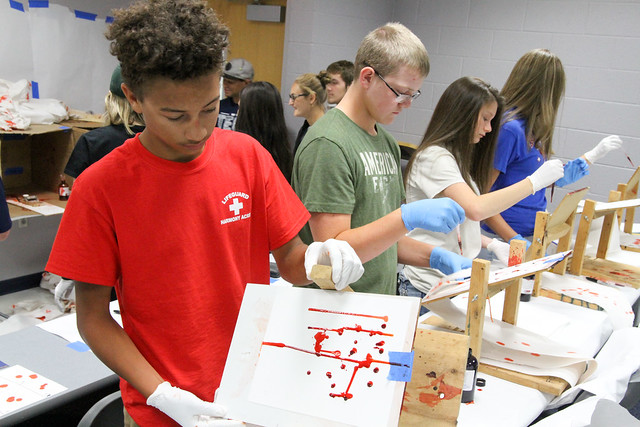Young detectives explore forensics at WVU Tech day camp
Most days Jennifer Merkle is a 14-year-old student from Princeton, West Virginia who likes to read books about crime and forensic science. But for two days in June, she was a real-life forensic investigator, examining fingerprint evidence, interpreting bloodstain patterns, casting footwear impressions and investigating the scenes of heinous crimes to figure out how the deeds were done – and who might have done them.
Merkle was on WVU Tech’s campus for the inaugural Forensic Investigation Summer Camp. The program is designed to teach young students about the duties of professionals in the fields of law enforcement and forensics, plus the science behind real-world forensic investigation.
She wants to be a bloodstain pattern analyst one day. She wasn’t surprised to find that the bloodstain class was her favorite.
"I think today is my favorite part, being able to look at the different types of blood patterns and deciding how to tell if the stain is blood or not,” she said. “I feel like I've been an investigator this week. It's awesome being able to see what you actually have to do at the scene."
For Roger Jefferys, a professor in the university’s Forensic Investigation program and camp director, students like Merkle are a great fit for the camp.
"The goal of the camp is to provide students who have an interest in these fields with a firsthand look at what they entail. The camp incorporated multiple disciplines within forensics, which allowed students to walk in the shoes of various forensic experts. This hopefully allowed them to see if forensics is a career path that they wish to pursue or not," he said.
The camp hosted its first session in early June and wrapped up with a second session on June 29-30. All told, more than 100 middle and high school students from West Virginia, Ohio and Virginia attended the program.
Campers spent their days attending lectures and participating in interactive demonstrations. They learned how to dust for and develop fingerprints alongside Melissa Halpenny, an instructor and fingerprint expert with the FBI. They explored footwear and tire tread impressions. They discovered how bloodstains can reveal a very detailed story of a crime. They learned how wounds can give investigators an idea about how a victim died. Campers even put all their new skills to work on five mock crime scenes at the WVU Tech Crime Scene House.
Zack Meador will be a senior at Shady Spring Hill School in the fall. The 17-year-old is a native of Daniels, West Virginia and wants to double-major in political science and forensic science, leveraging his education into a career in law enforcement and, eventually, public office.
His interest in the field was intensified by the camp experience.
"We learned about fingerprints, palm prints and different types of impressions. I think it’s incredible how scientists are able create compositions that really capture the detail that helps detectives piece it all together,” he said.
In addition to course and lab work, campers were able to interact with camp counselors, who were students currently studying forensic investigation and criminal justice at WVU Tech.
Kayla Hill, a forensic investigation major from Beckley, served as a counselor. She wants to go on to a master’s program in a few years and ultimately use her education to help people who have been impacted by crime. She also wants to help young students follow in her footsteps.
"I thought it looked really fun to come out here and share some of the knowledge that I've gained from the program. It really sparks their interest and it really does give them a good peek into the program to see the kind of fieldwork they would want to do," she said.
Jefferys agreed, and added that students are building powerful friendships as they figure out where they might fit into the forensics world.
“Students form a bond while tackling courses together and learning forensics alongside one another. The work is important, but these students also build friendships that outlast the camp and can follow them into their careers,” said Jefferys.
Jefferys said that the camp will return next year, and that the forensic investigation program at WVU Tech hopes to launch more community-oriented programs throughout the year.
Visit camps.wvutech.edu to find out more and check out photos from the camp on Flickr. Keep up with the Forensic Investigation program at WVU Tech on Facebook.
Photos: